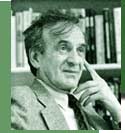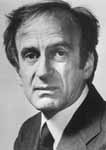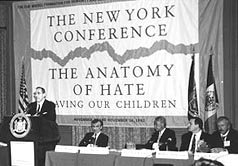

What is hate? Why
does hate occur? Why is it a prevalent derogatory theme in our society
as a whole? Hate; according to Webster's Dictionary, it is an intense
hostility and aversion deriving from fear or anger. The same fear and
anger which took countless lives in the past and during the Holocaust,
and which continues to cost lives in our present day society.
The Holocaust was caused by an immense undeserved hatred toward Jewish people. Countless lives were lost in fire ovens and gas chambers, and thousands of people were subjected to intense, inhumane torture, unimaginable to most of us, all on account of what? Hate. Hate which was fed and led by one manipulative, hateful, deceiving, and evil man, Adolf Hitler. He was and continues to be the epitome of evil in this last century. Why was he evil you might ask? What is the definition of evil, and does he accurately fit that description? An evil person is someone who does things that are morally bad or wrong. Someone who does things which cause ruin, injury, pain, or are harmful to other people. Adolf Hitler fits this description entirely. He caused pain and harm to a whole race of people. What drove him to such a strong act of iniquity? Hate. Hate drove him and hate continues to drive people to commit acts of violence and cruelty to innocent, undeserving people. With hate as his driving force, Adolf Hitler was able to use an innocently disguised campaign to captivate and brainwash a whole nation, and subject a wave of Genocide throughout. You are now able to see why a force as strong as hate, which can nearly wipe out an entire race of people, is a formidable sensation which should be wiped from humanity.
Elie Wiesel survived Hitler's upheaval of hate, and yet, however painful, he was able to share his experience with the world, captivate many hearts, and show to the nation the complete and utter calamity which was the Holocaust.
This website is dedicated
to an extraordinary man who overcame a spectacular obstacle in life, and
still managed to use his horrifying experience for the benefit of others.
His goal in life after surviving the Holocaust became to assuring that
the catastrophe, which occurred therein, never occurs again. Elie Wiesel
lost nearly all of his family during this terrible ordeal. In these "death-camps",
lives were not the only things lost. There, Elie's dreams were shattered,
his family was destroyed, his spirituality and conviction in a benevolent,
just, and virtuous God was broken. Elie's life became one everlasting
night, one death and horror filled existence that ate away at him to the
core of his being, until he became a stolid, emotionless person. Hate
had taken away his will and reason to live, and he was left with nothing.
No place to go no will to persevere, waiting only for a resolution to
his life or a beginning to a new one. He was left empty and full of questions.
What would he do next? Where would he go? What would be his motivation
to continue living? He then found what would fuel him to continue living
for the rest of his life, a will to evoke others to learn the truth about
the Holocaust, so that it may never happen again.
family was destroyed, his spirituality and conviction in a benevolent,
just, and virtuous God was broken. Elie's life became one everlasting
night, one death and horror filled existence that ate away at him to the
core of his being, until he became a stolid, emotionless person. Hate
had taken away his will and reason to live, and he was left with nothing.
No place to go no will to persevere, waiting only for a resolution to
his life or a beginning to a new one. He was left empty and full of questions.
What would he do next? Where would he go? What would be his motivation
to continue living? He then found what would fuel him to continue living
for the rest of his life, a will to evoke others to learn the truth about
the Holocaust, so that it may never happen again.
After a ten-year vow of silence, he finally decided that it was time to open himself up in order to show the world the truth and the moving reality of what happened during the Holocaust. He also wanted to assure that people got a full and personal account of the horrors that occurred at these appropriately named "death-camps". The wonderful thing about it is that he did not do this for the attention or the pity that he might receive; he did it because he wanted people to know the truth. He wanted our society to understand why hate is evil, and why such an unprecedented occurrence should never again take place.
He so selflessly dedicated
the rest of his life until the present, to ensuring that people  understand
the calamity of the Holocaust and the anatomy of hate. Hate; a word used
all too often to describe emotions in our society, and the sole reason
countless lives where lost in such unjust and inhumane ways, in these
concentration camps. Elie lived through that horrible experience, and
he as a humanitarian has opened his heart and his mind to the better understanding
of such a difficult subject. He did it, no matter how painful the experience,
because he knew that his accounts of the Holocaust could move and insure
that such a horrible experience would never repeat itself again. In the
words of Elie Wiesel, " It is inconceivable to us to look ahead to
the coming century without first looking back at the evil symbol of the
century that is now approaching its end".
understand
the calamity of the Holocaust and the anatomy of hate. Hate; a word used
all too often to describe emotions in our society, and the sole reason
countless lives where lost in such unjust and inhumane ways, in these
concentration camps. Elie lived through that horrible experience, and
he as a humanitarian has opened his heart and his mind to the better understanding
of such a difficult subject. He did it, no matter how painful the experience,
because he knew that his accounts of the Holocaust could move and insure
that such a horrible experience would never repeat itself again. In the
words of Elie Wiesel, " It is inconceivable to us to look ahead to
the coming century without first looking back at the evil symbol of the
century that is now approaching its end".





